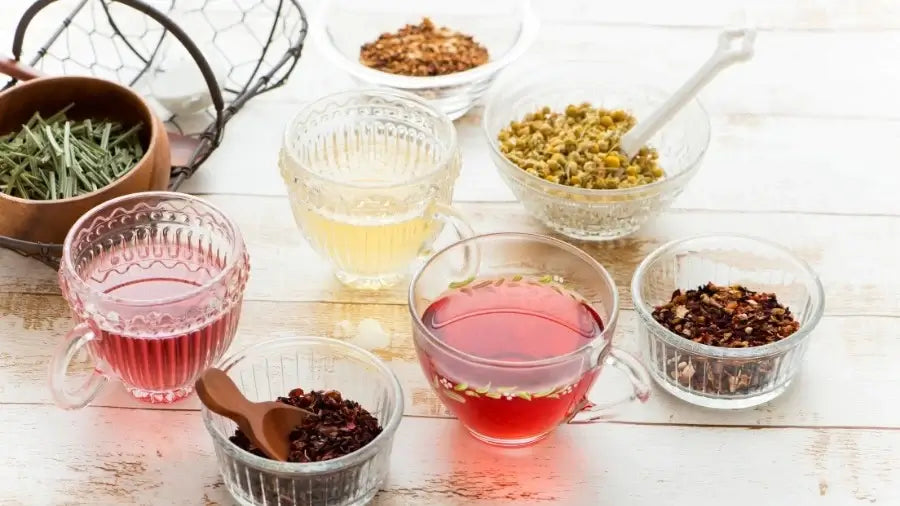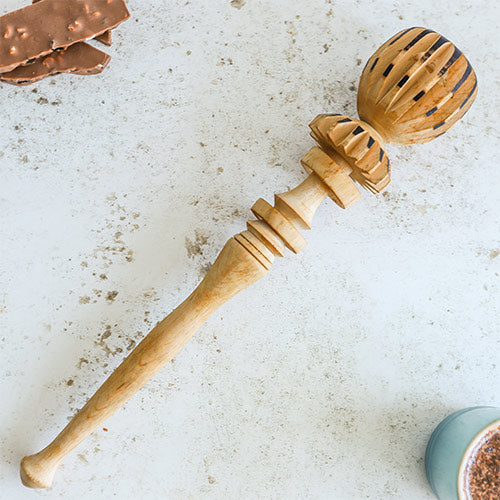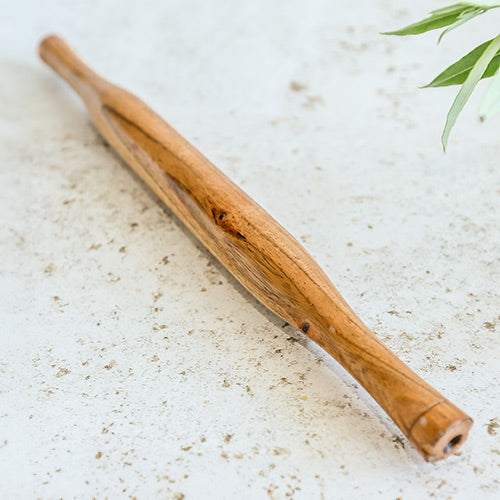Herbal tea or also known as herbal infusions have been used for thousands of years for medicinal purposes. Whilst the origin is unclear, it seems as though China is where it all began with the emperor. These teas are usually made up of natural ingredients including herbs, leaves, fruit, and spices. The wonderful thing about these is that there is indefinitely a tea for every type of health condition or illness. Those that invoke sleepiness, those that are the best for providing you with energy, even those that prevent chronic disease.
Herbal tea is different from the more traditional tea that is popular throughout the UK. The common tea is known as Camellia Sinensis. One of the great things about herbal teas is that they can be used instead of pharmaceuticals. As a herbal remedy instead of conventional made medicine. The main benefit of using herbal tea is the fact that you can get health benefits as well as avoid those medicines that come with many side effects.
1. Peppermint tea

Known to be soothing for people who regularly have stomach problems and is often used to help lessen the effects of IBS (Irritable bowel syndrome.) All types of mint work well at reducing a high temperature, I have tried this and it worked very well.
2. Chamomile flower tea

This type of tea is a powerhouse; it’s by far one of my all-time favourites. What’s so good about it? Well, it is after all a natural pain killer, it soothes anxiety and worry. It works somewhat as a natural sedative that can make you feel tired and is known to make you feel extremely calm. I have grown the chamomile flowers and they smell so naturally sweet. This herb is the main one in all types of bedtime teas and is often paired with valerian which is another type of herb that shares similar properties. Chamomile tea has anti-inflammatory properties and can soothe the digestive system
3. Lemon balm tea

Lemon balm is said to reduce stress levels, which is always a good thing! It does so by reducing cortisol levels.
4. Dandelion

This herb is a weed that grows naturally everywhere, it is used commonly in herbal tea for its antioxidant properties that are said to be good for your immune system. It also has diuretic properties that can help flush out toxins to improve your overall health. Dandelion tea is known for its detoxifying effects on the liver and kidneys, and it can help clear out excess waste from the digestive system.
5. Turmeric

This spice is known as the golden spice of life that is used throughout India, it has pain reduction properties which can numb your tongue. It can work wonders for headache sufferers and also for reducing other types of pain because of its anti-inflammatory properties, as a herbal tea it is good for those who do strenuous exercises in the gym. Turmeric tea can help reduce inflammation and support liver function.
6. Ginger

It is strong at fighting belly aches and nausea, in the form of tea it can help you recover from illnesses such as sickness and diarrhoea. Ginger tea can help stimulate digestion and improve bowel movements, helping to clear out the gut.
7. Raspberry leaf tea

Whilst raspberry leaf tea has a subtle bitter flavour, it does provide many health benefits. Raspberry leaf contains lots of healthy vitamins, minerals and is rich in antioxidant properties. It has also been used as a herbal remedy for mums to be, as a method to induce labour during the last two months.
This is because it is said to relieve some pain during labour and can supposedly help the cervix soften. If using it as a method to induce labour you should drink it moderately, daily. Be sure to not have it before 32 weeks as it can cause pre-term labour.
8. Fennel

High in vitamin C which is responsible for providing optimal immune system health and tissue repair. The potent polyphenols found in the plant are capable of preventing various diseases, and illnesses. Fennel has also been directly linked with a suppressed appetite, improved digestion, and reduced inflammation.
9. Apple & Cinnamon

Both of these ingredients are separately so good for you but the flavour combination is too good to keep them apart. Apple tea has the same health benefits that the fruit has as a whole. It’s great for overall bone health. Its natural flavonoids are capable of reducing eye-related diseases.
As with most fruits, it can provide a benefit to the immune system. Cinnamon and apple are both good for promoting heart health and if you forget to eat your daily apple as the doctor recommends then this herbal tea may help you out.
10. Elderflower & Echinacea

Commonly used to make juice type cordials, if you do not drink herbal teas often, the flavour may be overlooked. This tea may taste of light floral notes with a slight bitterness. Whilst in my opinion it is not the best-tasting tea, if you are feeling under the weather it could be your best friend. It is incredible when it comes to helping unblock your sinuses, treating colds, or bronchitis. Elderflower is also known for its ability to reduce symptoms of hay fever.
11. Nettle

If you have not had nettle tea before, you may associate it with the stinging nettle and that is the exact nettle that we are talking about. I dislike those itchy stings you get from the herb and when I found out they were edible I was surprised. When I found out that they were really good for you, I was completely shocked. What is it good for? Stinging nettles in the form of a brew can actually help the body get rid of toxins. It also flushes the kidney and bladder to prevent infections.
That’s not all, it can also lower blood pressure, aid in blood circulation and is a rich source of potassium. Wow, I won’t be scared of nettles anymore. The tea tastes quite plain, but at least it has a ton of health benefits and doesn’t sting the tongue.
12. Green tea

Widely associated with weight loss, green tea is great for energising the body and mind. Moreover, green teas are packed with nutrients and antioxidants, thought to help prevent cancer and generally keep you feeling good. If you are not already won over by the numerous health benefits, there are many different green teas that vary in taste, giving you the opportunity to explore different flavours, such as oolong, jasmine, matcha and my favourite, sencha.
13. Hibiscus

Hibiscus tea is a good remedy for a range of digestive ailments and for improving your general digestive health. The taste is comparable to cranberries, which are not my cup of tea (sorry, not sorry) but can be softened with ingredients containing natural sweeteners such as honey, providing health benefits all of their own.
Of course, if you’d prefer to keep your tea sugar free, you may find that you love hibiscus tea without needing to add any other flavours. You’ll also be happy to know that hibiscus can make a nice iced tea as well as the more traditional, hot way of serving this herb.
14. Sage

Sage is often recommended for use to ward off oral infections because of its antimicrobial effects. Another benefit of sage is that its chemical structure is similar to that of oestrogen, a sex hormone in women that diminishes once the menopause begins.
Because of this, sage tea can prove to be effective in the treatment of some of the side effects of the menopause as it can bind to the receptors that oestrogen would have bound to before its concentration declined.
15. Lemongrass

Delicious and fragrant Thai curries come to mind when I think of lemongrass, which made me happy to discover that lemongrass can also make for a great cuppa. Lemongrass tea naturally contains zero caffeine and is known for its calming effects – making it an exemplary sleep aid and helpful in reducing anxiety and stress. For a student like me who also struggles a lot with anxiety, this tasty concoction is the perfect end to a long day.
16. Liquorice

A nice, warm liquorice tea can be great for soothing a sore throat and is also used to protect and settle the digestive tract through bouts of indigestion and acid reflux. It is important to note, however, that liquorice tea should not be consumed every day and should only be used in the short term to treat conditions mentioned above – prolonged use of liquorice can be harmful to you liver and other organs as it can upset the balance of electrolytes in your body.
17. Burdock

Burdock root tea can act as a natural diuretic, helping to flush out toxins from the body.
18. Mint Garden Digestif

Herbal teas have been known for their incredible healing properties for centuries now. They have become increasingly popular in recent years, especially for their digestive benefits. I recently suffered from a horrible stomach bug, the symptoms included indigestion, acid coming up, stomach cramps, and other discomforts. I decided to try the Mint Garden Digestif herbal tea by Dragonfly. The tea is a digestive blend of peppermint, fennel, and dandelion, all of which are great for digestion.
The tea smells quite strong and has a typical yellow colour that is common in most herbal teas. It has a refreshing fusion of celebrated herbs from the British and European botanical traditions. The tea is perfect after a meal to cleanse and support digestion. It balances light freshness with a sweet herbal lift.
Although some herbal teas taste bland and the same, the Mint Garden Digestif has a distinct flavour that is quite soothing on the stomach. It tastes like peppermint tea, but with a little something extra. I found it to be quite comforting and relaxing, which helped me settle my stomach. If you are suffering from digestive problems or a stomach bug, I highly recommend trying the Mint Garden Digestif herbal tea. It has worked wonders for me and helped me alleviate my symptoms.
Herbal tea (Frequently asked questions)
Who should drink herbal tea?
It’s safe to say that herbal teas are suited to most people but can be even more beneficial to the elderly. They could also help those who struggle to sleep simply by replacing their usual caffeinated drink with a healthier herbal alternative. It could also be given to children instead of juice for a tasty more natural beverage.
Certain types of herbal tea could even be suited to those who are pregnant. As each type of tea provides a different health benefit. Herbal tea as a whole can help you relax, can boost your immune system, and can reduce pain. It can also prevent illness and disease, improve your digestive system and brain function.
Where can I buy herbal tea?
You can buy herbal teas online, from supermarkets, or if you would prefer you could go the DIY route. It doesn’t always have to be from a traditional teabag. For example, you can buy a tea strainer and place larger ingredients such as homegrown or dried chamomile flowers. Perhaps even chunks of fresh root ginger, or mint leaves.
One of the most popular herbal teas that people make time and time again is honey and lemon for when they are feeling ill with a sore throat. This works in the way that the lemon breaks up the mucus from the throat and the honey lubricates it as well as providing some antioxidant properties that prevent bacteria.
Is green tea good for digestion
Yes, green tea is good for digestion. Green tea contains polyphenols that help to improve your body's digestive process. It can reduce inflammation in the gastrointestinal tract and be an effective solution for digestive issues such as excessive gas, bloating, and IBD. Drinking green tea regularly can also improve insulin sensitivity in the body. Additionally, green tea has antioxidants and is effective in preventing dental caries and reducing cholesterol and lipid absorption in the gastrointestinal tract. However, it's important to be mindful of caffeine content and limit consumption to two or three cups per day to reap the benefits.
Best herbal tea for constipation
Herbal teas can be an effective way to alleviate constipation. Senna is one of the most commonly used laxative ingredients in teas. Peppermint tea, ginger, dandelion, black tea, green tea, licorice root, marshmallow root, chamomile, and parsley are some other herbs that may have laxative or muscle-relaxing effects, helping to stimulate bowel movements and relieve constipation. However, it's important to use caution when consuming herbal teas, as they are not regulated by the FDA. Pregnant women should avoid certain herbal products, and it's important to limit how much and how often laxative teas are consumed. Regular hydration and a high-fiber diet are also effective ways to prevent and treat constipation.
Herbal tea for stomach ulcer
There are several herbal teas that can help soothe the inflammation and alleviate the pain caused by stomach ulcers. Chamomile tea contains anti-inflammatory properties that help reduce inflammation in the stomach lining and may help relieve stomach ulcer pain. Peppermint tea, licorice tea, and ginger tea are also good options to help soothe the stomach lining and reduce inflammation. Additionally, holy basil may help protect against stomach ulcers, reducing symptoms like stomach pain, heartburn, and nausea. It's important to keep in mind that while herbal teas can be helpful, they should not be used as a substitute for medical treatment. If you suspect you have a stomach ulcer, it's important to seek medical attention to properly diagnose and treat the condition.
Best tea for gut cleanse
There are several herbal teas that can assist with gut cleansing. Comfort Colon Cleanse Tea and Sweet Himalayan Detox Green Tea are two specific blends that contain digestion-supporting ingredients like turmeric and cardamom to help with gut cleansing. However, it's important to keep in mind that a balanced diet and exercise regime are also important factors for optimal gut health.
Differences between herbal tea and herbal infusions
Herbal tea is commonly made with hot water whereas herbal infusions are somewhat a new type of drink that is made with cold water. Flavours include but are not limited to rose, watermelon, strawberry, mint, and more. Whilst, for quite a while we have been able to get flavoured waters. They have not been made with natural ingredients. Generally using artificial flavourings which is why I do not consider them a herbal infusion.
Twining’s and Tea pigs are the leading companies in regards to this new type of water infused drink. They both claim that they use only all-natural ingredients. How does herbal infusion work? You simply place a herbal infusion teabag into a 500ml bottle of water, leave it for 5 minutes and enjoy.
One of the most popular herbal teas that people make time and time again is honey and lemon for when they are feeling ill with a sore throat. This works in the way that the lemon breaks up the mucus from the throat and the honey lubricates it as well as providing some antioxidant properties that prevent bacteria.
Up next: 6 Ways to improve your sleep










